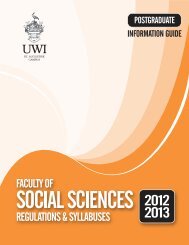Faculty of Humanities and Education (Postgraduate) - The University ...
Faculty of Humanities and Education (Postgraduate) - The University ...
Faculty of Humanities and Education (Postgraduate) - The University ...
You also want an ePaper? Increase the reach of your titles
YUMPU automatically turns print PDFs into web optimized ePapers that Google loves.
100<br />
POSTGRADUATE REGULATIONS & SYLLABUSES 2012 - 2013<br />
THE FACULTY OF HUMANITIES & EDUCATION<br />
Articles<br />
Athey, I. J. (1971). Language models <strong>and</strong> reading. Reading<br />
Research Quarterly, 7(1), 16-110.<br />
Bryan, B. (2002). Making language visible: Language Awareness<br />
in a Creole-s Speaking environment. Pace Newsletter.<br />
Retrieved from http://www.hawaii.edu/satocenter/<br />
pace/13-conferences.htm<br />
Craig, D.R. (2001). Teaching language <strong>and</strong> literacy in vernacular<br />
situations: Participantevaluation <strong>of</strong> an in-service teachers’<br />
workshop. Journal <strong>of</strong> <strong>Education</strong> <strong>and</strong> Development in the<br />
Caribbean, 5(1). Retrieved from http://www.hawaii.edu/<br />
satocenter/pace/12-article.htm<br />
Folkes, K.C. (1993). Issues <strong>of</strong> assessment <strong>and</strong> identification<br />
<strong>of</strong> Anglo-phone Caribbean students in a migratory<br />
environment. ED 367 170. Retrieved from http://www.<br />
eric.ed.gov/ERICDocs/data/ericdocs2sql/content_<br />
storage_01/0000019b/80/15/51/0e.pdf<br />
Freebody, P., Luke, A. & Gilbert, P. (1991). Reading positions <strong>and</strong><br />
practices in the classroom. Curriculum Inquiry, 21(4), 435-<br />
457.<br />
Geyer, J.J. (1972). Comprehensive <strong>and</strong> partial models related to<br />
the reading process. Reading Research Quarterly, 7(4), 541-<br />
587.<br />
Hyl<strong>and</strong>, K. (2007). Genre pedagogy: Language, literacy <strong>and</strong> L2<br />
writing instruction. Journal <strong>of</strong> Second Language Writing,<br />
16, 148-164.Nero, S.J. (2006). Language, identity, <strong>and</strong><br />
education <strong>of</strong> Caribbean English Speakers. World Englishes,<br />
25(3/4), 501-511.<br />
Nero, S.J. (1996). ESL or ESD? Teaching English to Caribbean<br />
English Speakers. Paper presented at <strong>The</strong> Teachers <strong>of</strong><br />
English to Speakers <strong>of</strong> Other Languages Convention,<br />
March 30, 1996, Chicago, IL. ED 394 345.<br />
Shanahan, T. , & Neuman, S. B. (1997). Literacy research that<br />
makes a difference. Reading Research Quarterly, 32(2), 202-<br />
210.<br />
Simmonds-McDonald, H. (2004). Trends in teaching st<strong>and</strong>ard<br />
varieties to Creole <strong>and</strong> vernacular speakers. Annual Review<br />
<strong>of</strong> Applied Linguistics, 24, 187-208.<br />
Simmons-MacDonald, H. <strong>and</strong> Robertson, I. Exploring the<br />
Boundaries <strong>of</strong> Caribbean Creole Languages. UWI Press,<br />
2006.<br />
Simonsen, S. (1991). Transfer <strong>of</strong> learning between reading <strong>and</strong><br />
writing: Models <strong>and</strong> implications. Review <strong>of</strong> Research in<br />
<strong>Education</strong>, 8(2), 2-6.<br />
Stahl, S., Duffy-Hester, A., & Stahl, K. (1998). Everything you<br />
wanted to know about phonics (but were afraid to ask).<br />
Reading Research Quarterly, 33(3), 338-355.<br />
Williams, J. P. (1971). A review <strong>of</strong> several models <strong>and</strong> theories<br />
<strong>of</strong> reading acquisition. Paper presented at the meeting<br />
<strong>of</strong> the American <strong>Education</strong>al Research Association, New<br />
York, N.Y., February 4 -7, 1971.<br />
Winford, D. (1997). Re-examining Caribbean English Creole<br />
Continua. Word Englishes, 16(2), 233-279.<br />
YEAR:<br />
SEMESTER:<br />
COURSE CODE: EDRL 6002<br />
COURSE TITLE: READING DIAGNOSIS, INTERVENTION AND<br />
ASSESSMENT<br />
NUMBER OF CREDITS: 4<br />
COURSE DESCRIPTION: This course, Reading Diagnosis,<br />
Intervention <strong>and</strong> assessment, is essentially about the guiding<br />
perspectives/principles <strong>of</strong>, <strong>and</strong> perspectives on, the diagnosis,<br />
intervention, <strong>and</strong>, monitoring <strong>of</strong> reading, <strong>and</strong> <strong>of</strong> procedures <strong>and</strong><br />
tools for prosecuting these processes. Topics such as the following<br />
will be explored: perspectives on reading difficulties, models<br />
<strong>of</strong> reading in diagnostic procedures, targeting instructional<br />
plans <strong>and</strong> intervention, <strong>and</strong> issues in reading assessment. <strong>The</strong><br />
purpose <strong>of</strong> the course is to equip students with the knowledge,<br />
tools, techniques, insights, <strong>and</strong> attitude necessary to effectively<br />
<strong>and</strong> efficiently gauge students’ reading developmental status<br />
<strong>and</strong> needs, to design differentiated instructional plans to<br />
cater to identified needs, <strong>and</strong> to monitor progress toward the<br />
acquisition <strong>of</strong> appropriate levels <strong>of</strong> competence.<br />
CONTENT<br />
Content is divided into two broad components: Background to<br />
assessment <strong>and</strong> Learner dimensions.<br />
Background to assessment will be delivered via lectures, which<br />
will address the following major topics:<br />
• Perspectives on reading difficulties<br />
• Factors involved in reading difficulties<br />
• Models <strong>of</strong> reading in reading diagnostic procedures<br />
• Screening <strong>and</strong> progress monitoring:Tools <strong>and</strong> techniques<br />
• Reading diagnosis – principles, processes <strong>and</strong> tools<br />
• Targeted instructional plans <strong>and</strong> Intervention<br />
• Issues in reading assessment.<br />
Learner dimensions will be delivered via workshops, which will<br />
address the following major topics:<br />
Learner dimensions (Workshops 1 – VI)<br />
Workshop I Attitude, Motivation, Interest, Experiences<br />
Workshop II Holistic Assessment; Assessment in Creole<br />
Contexts<br />
Workshop III Reading Concepts, Phonological Awareness,<br />
Word Recognition;<br />
Workshop IV Comprehension, Fluency, <strong>and</strong> Vocabulary<br />
Workshop V Spelling <strong>and</strong> Writing<br />
Workshop VI Reflection <strong>and</strong> Progress Monitoring.

















